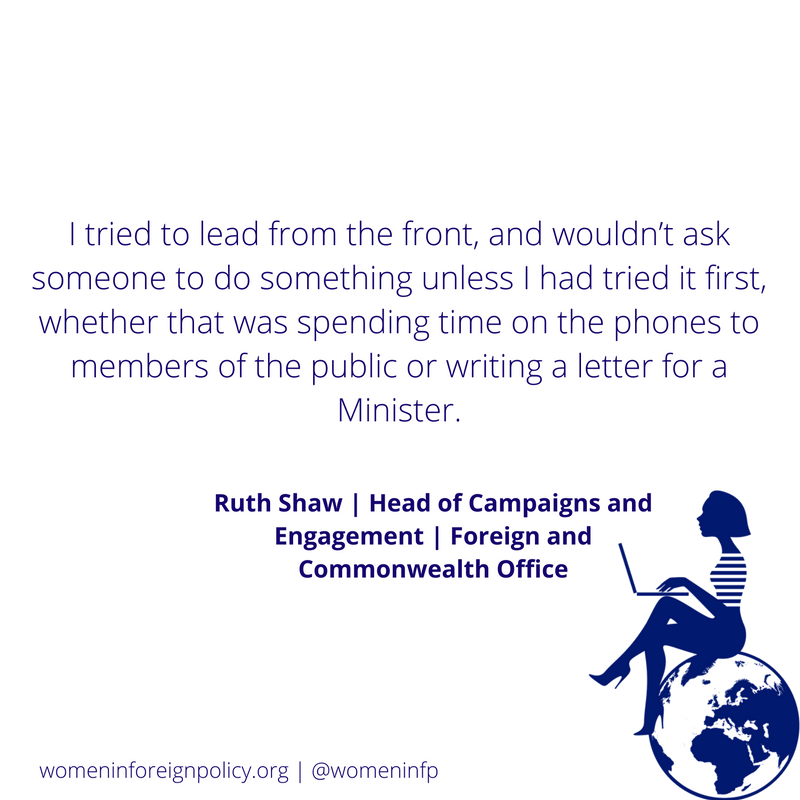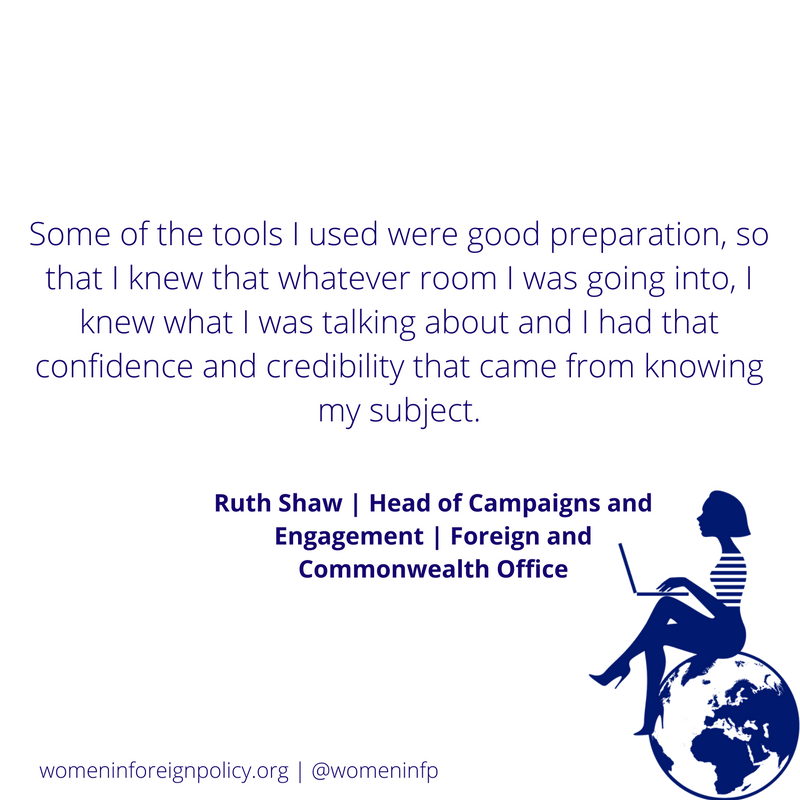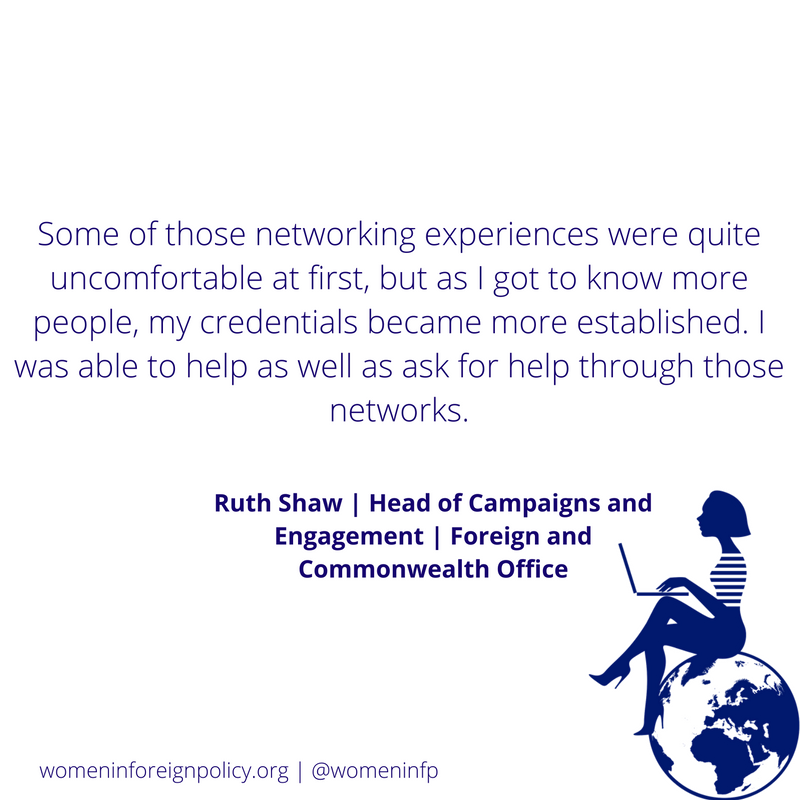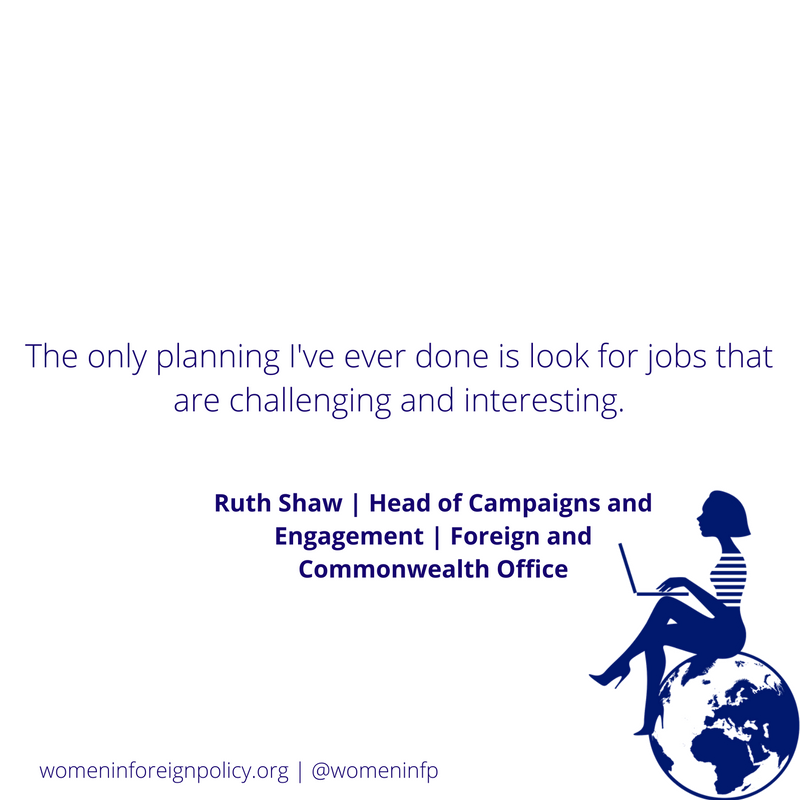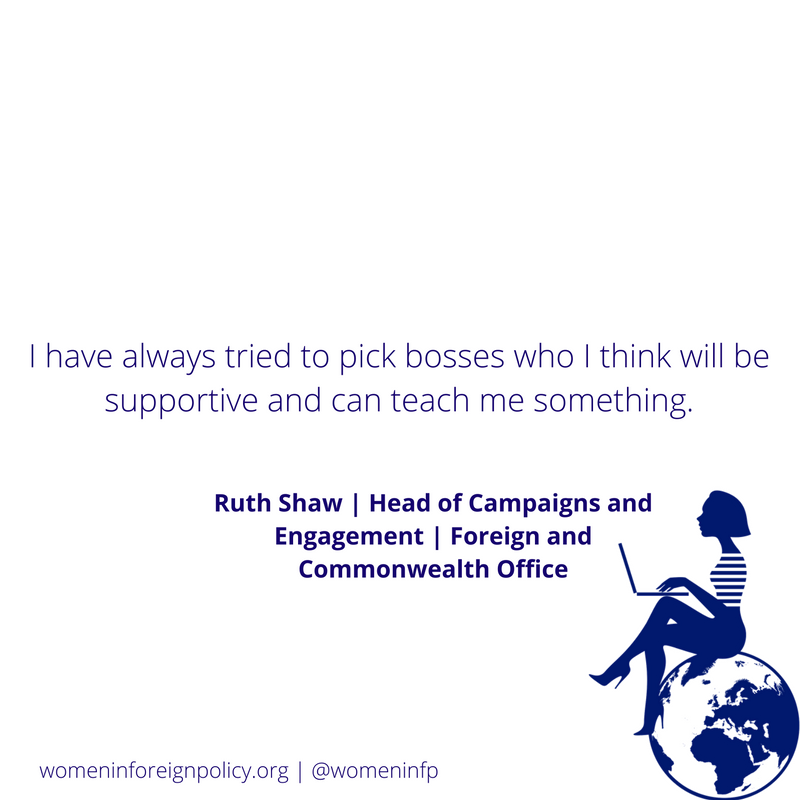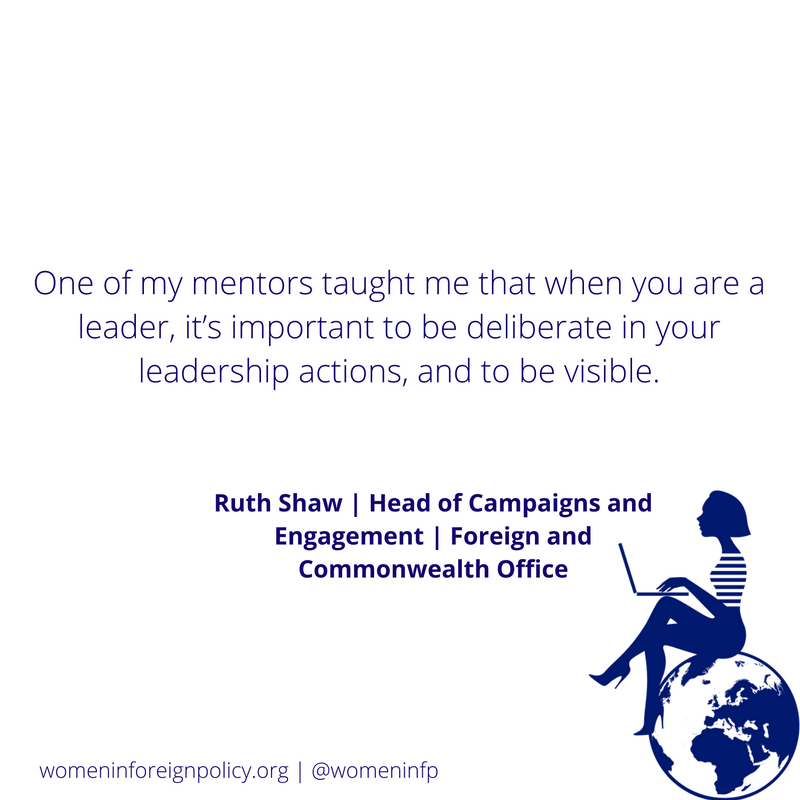Ruth Shaw
/17 years' experience
CV in brief:
Career so far: Governor, Sutton College | Board member, Women in Football | Chief Executive, Sports Grounds Safety Authority | Advisory Board Member, Women's Sport Network | Chief Executive, Football Licensing Authority | Deputy Director, Department for Culture, Media and Sport
Education: BA history University of Nottingham
Find Ruth online: LinkedIn | Twitter
Exclusive interview by Lucie Goulet, 2 June 2016
Head of Campaigns and Engagement | Foreign and Commonwealth Office
What do you do as head of Campaigns and Engagement at the Foreign Office?
It's a communications role, which is really varied. It includes internal communications for the 13,500 people in 268 posts in 168 countries around the FCO network, and the management of a network of senior regional communicators in different parts of the world. We lead our communications capability through the network. We run media training and training on communication for leadership, including for new Heads of Mission.
My team is also responsible for soft power policy and public diplomacy, or how we promote the UK overseas. We provide funding for the British Council and the BBC World Service. We've got creative services colleagues producing films, info-graphics and publications such as the annual report, and we also look after the staff survey to measure employee engagement.
We also look after international scholarships: 1,800 international students from 150 countries come to the UK each year to study and learn about UK life through a range of programmes such as the Chevening and Marshall Scholarship programmes.
This is a very broad portfolio. How do you manage to be involved with every aspect?
A lot of curiosity and asking questions. We have weekly round-up meetings with the whole team, where everyone talks about the priorities that are coming up for the week. I have three deputies, each covering a different area, who feed through things I need to know. Overall, I try to make capacity for hearing and knowing about what's going on.
The key is good internal communications and talking to the members of the team about what's happening on a regular basis.
How do you manage a team of 45 people?
I hot desk around the office, so I sit with different teams every day. That's a good way to know what's going on.
The team is well structured and my deputies lead their teams so I don't have to manage every person individually.
Being visible and out-and-about a lot is important, as is seeing and speaking to people and finding out what they're up to.
How did you get to your current job?
I applied for a job as Head of Mission to the Holy See but I didn't get short listed for it. I didn’t have the skills and the experience the FCO were looking for, as they wanted someone with Ambassadorial experience.
Until I came into the Foreign Office, I underestimated how important diplomatic experience and skills would be to a role like that. Being a Diplomat is a unique career and being an Ambassador is a 24/7 job. We have some amazing people doing incredible things all around the world.
I didn’t get the Ambassador position but I applied for my current role at the same time and was successful. I’d had previous experience of communication and have managed big teams. My previous roles have focused on leadership and change management rather than diplomacy.
I had worked at FCO in 2005 for a year as well, looking at public diplomacy and how to help promote the UK overseas, so I had a bit of context before coming into this role in 2015.
When you say leadership and change management, what do you mean?
My previous role was as Chief Executive of a government body that looked after safety at sports grounds. I worked for the Football Licensing Authority (FLA), which became the Sports Grounds Safety Authority (SGSA). My role was to expand the FLA’s powers from football to all sports and from an England and Wales focus to an international focus. I oversaw that transition and led the team through that change.
That was building on previous experiences in government around change management and leadership. While I was at the Department for Culture, Media and Sport I carried out roles which were about creating new teams or changing the way that we did things.
One of my roles was to bring together the staff that carried out public engagement activities, such briefings for Ministerial visits, correspondence, Parliamentary Questions and Freedom of Information requests. We brought together various parts of the department into a single team of 45 people to centralise that operational activity. Initially not everyone wanted to transfer into that team and not everyone realised just how important the work was. It was my job to explain the importance of the team and motivate and encourage the individuals to fulfil their potential in those roles.
Part my role was also to drive up standards. That was quite challenging as we had a high workload and we did not always have enough people, but by helping the team and the rest of the Department to understand the work and why it mattered, we began to achieve results and a number of people went on from those roles to other roles on promotion, which was really satisfying.
What's most important about managing change?
One of the really important things for me was to understand what people’s concerns and fears were around change. I tried to understand all the things I might be asking them to do, to have done them first and to know what each job involved. I tried to lead from the front, and wouldn’t ask someone to do something unless I had tried it first, whether that was spending time on the phones to members of the public or writing a letter for a Minister.
Seeing things from other people’s perspective probably is the biggest thing I learnt through those change management roles. People do things for their own good reasons. I needed to understand what those reasons were, what motivated people. People have their life outside work, and they have other things they are worrying about.
Regular, good communications about what is happening and why is also important. We had to give clear parameters throughout the change so people could make choices and feel some certainty around their own futures.
Another lesson I learned about change was to look up as well as down. Initially, I felt my duty of care was solely to my team - that I needed to take them with me and to make sure they were okay. Sometimes I wasn't looking up and saying, "What does the person above me need? How is this difficult for them and how can I help?"
Let’s talk about your move from the Department for Culture, Media and Sport (DCMS) to the Foreign Office. How did it happen?
There are a number of loans and interchange between departments. I'm a Home Civil Servant, and so I can work in a range of government departments. I’m currently at the Foreign Office on a three-year loan. At the end of those three years, I'll either extend or return to DCMS. We're encouraging more people to move across departments, so they have broader experience and bring fresh perspectives.
Ruth Shaw with the International Leaders Programme
How did you join the civil service in the first place?
I joined as a graduate trainee through the Fast Stream program in 1999. I had never heard of the civil service until my tutor in my final year of university mentioned it. I applied, sat the online tests and then went through an assessment centre.
I was successful and I picked the Department for Culture, Media and Sport as I had done a History degree and I was volunteering at a museum at the time. I had a passion for arts and culture and to start with I went through a series of six to 12 months postings in the DCMS.
After your last promotion, you worked on sports ground safety, which was quite a male-dominated environment. How did you deal with it?
It was quite challenging. I had first been promoted quite early in my career so I was used to being in rooms where I was one of the youngest people or which were more male then female, but not to same extent as football, where I could be the only woman in the room and very often the youngest.
Some of the tools I used were good preparation, so that I knew that whatever room I was going into, I knew what I was talking about and I had that confidence and credibility that came from knowing my subject.
I also invested time in networking, and built networks that were both personal and professional. The personal ones were useful when I had a bad day or a difficult situation, as I had people I could talk to. It was useful to share the experience with them, to know I wasn’t the only one.
The professional networks were useful in a different way as people got to know me as an individual but also got to understand what I brought to the table. Some of those networking experiences were quite uncomfortable at first, but as I got to know more people, my credentials became more established. I was able to help as well as ask for help through those networks. The more I did it, the more comfortable I felt, and I just kept doing it until it felt less strange.
Did you have a personal interest in sports?
I didn’t consciously pick jobs that had sports-related things, but I'm fascinated by the cultural and social side of the sport. I spent a year at the National Football Museum and saw the power of sports in terms of what it could do for communities and individuals.
I worked on the 2012 Olympic and Paralympic Bid as well. I had a sports policy job around anti-doping for the Sports Minister for a while too. It was all fascinating.
I thought football was particularly interesting culturally. It has a long, traditional history here in the UK and does amazing things around the world as well.
Is this something you still use now as part of your soft power portfolio?
Absolutely. The Premier League is an incredible example of the power of sport. It is one of the UK’s great soft power assets and it is watched all around the world. Sport promotes British values around fair play and inclusion.
The Rugby World Cup was another example of the power of sport on the global stage.
You're 17 years into your career. How do you plan for the next stage?
The only planning I've ever done is look for jobs that are challenging and interesting. It was appealing to come to the Foreign Office, because it's an impressive organisation doing amazing things around the world. Carrying out a communication role was a bit different for me so there was a bit of stretch in that.
At the end of these three years, I will look at what the next stretch could be. I came from running quite a small organisation. Maybe next I’d like to run an organisation that is a bit bigger, using the skills that I've developed here. Beyond that I haven't really planned any point through my career.
I have always tried to pick bosses who I think will be supportive and can teach me something. I’ve got a very supportive boss here at the FCO who I’m learning lots from – so that box is definitely ticked.
What would your advice be to a girl or a student, who would like to join the Civil Service?
I’d definitely say that it's a brilliant opportunity to have a lot of variety in your career and to work with smart, committed people who care passionately about public service.
There are other ways in, apart from the Fast Stream. We have short-term, paid internships for example. That way you can see if it’s for you.
My other advice would be to ask questions. Ask for help or information, or if you know someone who is working in the civil service ask if you can chat about what they do.
Most skills required in the Civil Service and the Diplomatic Service are transferable skills which you would be able to develop in a range of ways, so it wouldn't matter if you had never done a job like this before. Think about how you relate to people and how you deliver results. If you can demonstrate that in different ways then, the civil service is a good place to think about working.
You're very involved with FCO Women, the women’s network at the FCO. Why was it important to you?
We’re still on an unequal playing field, in terms of gender equality. There has been great progress, particularly in the UK. We've come a long way, but there's still more to do. Being in the world of football really made me realise that. I was on the board of Women in Football, a professional network for women working in the industry.
The Board showed me there was a lot we could do to help other women to get into more senior positions. That's still the case within the FCO even though we have more and more female Heads of Mission. We’ve not yet had a female Ambassador in a key post like Washington, Paris or the UN, and we’ve never had a female Head of the Foreign Office. So it’s work in progress and FCO Women is helping to champion that change.
As a general point I think organisations should reflect the populations they serve. I come from a strong family of female role models who encouraged me to think anything was possible. I would like other people to have that support and confidence too, and women’s networks are just one way of providing that.
How do you concretely help the women you work with at the FCO?
I'm very happy to talk to colleagues and help them think about what steps they need to take to develop their skills and experience. I mentor a number of people across Whitehall, most of whom happen to women. I’m happy to take the time to help people think about their careers, their skills and how they can develop them, what are the jobs they might go for in the future, and how would they prepare for that.
I try to recognise and celebrate successes where I see them, so that people feel appreciated and valued, but also so that others take note. Many women think that if you do a good job, you will be recognised. It’s not like that. It's a myth. You need to think about how you showcase what you are doing, and that might be through other people who champion and support you. I champion people who have talent but who might not be putting themselves forward. I try to create opportunities, to encourage people in a safe environment to stretch themselves, to put themselves forward for leadership roles or activities. That might be as simple as asking them to chair a meeting or talk at a workshop, but it’s a practical step.
The other important thing is to encourage people to make their time for themselves, because it's really easy when you've got a busy day job to just be very task focused. We all need to invest time in our own development.
What's the most useful thing you've learnt from your mentors?
One of my mentors taught me that when you are a leader, it’s important to be deliberate in your leadership actions, and to be visible.
He said that it’s not enough just doing the right thing, you need to let people know you're doing the right thing. He talked about in terms of performing your leadership role and not assuming that, because you're doing it, people would see it. You have to almost over emphasize your action.
You need to be really clear about the messages you send about what was acceptable, what's not acceptable. As someone wise once said, ‘what you permit you promote’. I try to think about that and model the behaviours I want to see in my leaders and in my teams.



